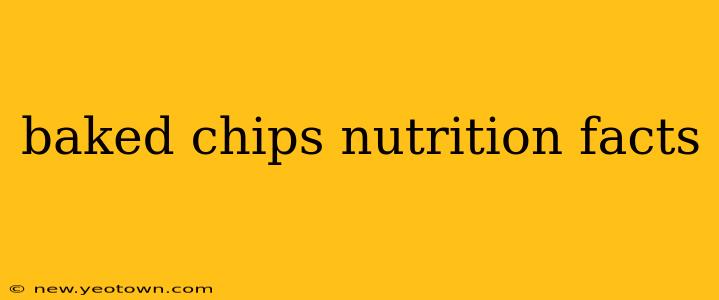Let's be honest, the irresistible crunch of a potato chip is hard to resist. But with so many options flooding the market – baked, fried, kettle-cooked – navigating the nutritional landscape can feel like a minefield. Today, we're focusing on baked potato chips, exploring their nutritional profile and addressing some common questions. Imagine the satisfying crunch, but with a slightly healthier twist. That's the promise of baked chips, but let's delve deeper to understand the reality.
What are the nutritional benefits of baked potato chips compared to fried chips?
The primary nutritional advantage of baked potato chips lies in their significantly lower fat content. Fried chips are submerged in oil, absorbing a substantial amount of fat, resulting in a much higher calorie count and saturated fat content. Baked chips, on the other hand, use significantly less oil (or in some cases, no added oil at all), leading to a lower fat and calorie profile. This reduction in fat contributes to a lower overall calorie count per serving, making baked chips a potentially better option for those watching their weight or intake of unhealthy fats. However, it's crucial to remember that "baked" doesn't automatically equate to "healthy." The processing methods and added ingredients still significantly impact the nutritional value.
How many calories are in a serving of baked potato chips?
This is a tricky question, because the calorie count per serving of baked chips varies drastically depending on the brand, the size of the serving, and the ingredients used. A typical serving size (about 1 ounce) might contain anywhere from 120 to 150 calories. However, it's not uncommon to consume far more than a single serving in one sitting! Always check the nutrition label on the specific bag of chips you're consuming for the most accurate information. Reading the nutrition facts panel is your best friend when making informed choices.
Are baked potato chips healthier than other types of chips?
Compared to fried potato chips, baked chips generally offer a healthier alternative due to their lower fat content. However, it's essential to compare the complete nutritional profile. Some baked chip brands add significant amounts of salt, sugar, or other artificial flavors to enhance taste, negating some of the benefits of lower fat. Therefore, a direct comparison requires scrutinizing the complete nutritional information—not just the fat content—of various chip brands and types. Look beyond just the "baked" label and examine the full ingredient list and nutritional panel.
What are the main ingredients in baked potato chips?
The core ingredient in most baked potato chips is, unsurprisingly, potatoes. However, the processing methods and added ingredients can significantly impact the final product's nutritional profile. Many brands add various seasonings, preservatives, and flavor enhancers. Some may contain oils (even baked versions often utilize some form of oil for baking) and additives to improve texture and shelf life. Therefore, thoroughly examining the ingredient list to understand what you're actually consuming is critical. Opt for brands with minimal processing and a straightforward ingredient list.
Do baked potato chips contain trans fat?
Generally, baked potato chips should be trans fat-free. Trans fats are primarily found in partially hydrogenated oils and are generally avoided in modern food processing. However, always check the nutrition label to ensure the specific brand you're considering doesn't contain any trace amounts.
Choosing the right baked chips involves a careful assessment of the nutrition facts. It's not simply about the baking process; the ingredients and processing method play a significant role. By actively reading labels and comparing options, you can make informed choices that align with your dietary goals and preferences, ensuring you enjoy that satisfying crunch without compromising your health.

